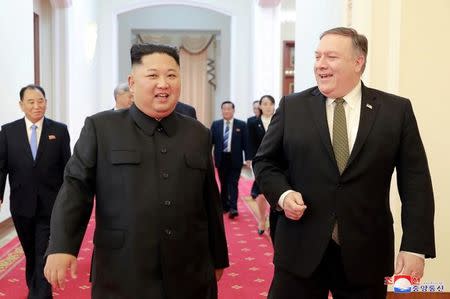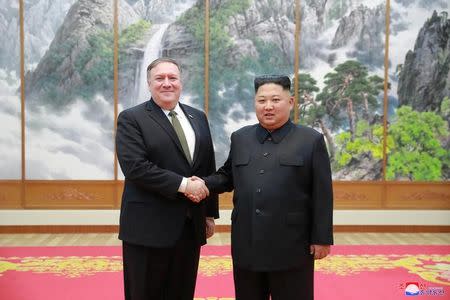U.S.' Pompeo hails 'significant' North Korea progress; experts sceptical
By Hyonhee Shin and David Brunnstrom
SEOUL/WASHINGTON (Reuters) - U.S. Secretary of State Mike Pompeo on Monday hailed "significant progress" in talks with North Korean leader Kim Jong Un at the weekend and said the sides were "pretty close" to agreeing details for a second summit between Kim and President Donald Trump.
However, experts questioned what Pompeo had achieved on Sunday on his fourth visit to Pyongyang this year. They said the North Korean leader appeared simply to be repackaging and dragging out past pledges.
Pompeo told reporters Kim had said he was ready to allow international inspectors into North Korea's Punggye-ri nuclear testing site and the Sohae missile engine test facility as soon as the two sides agreed on logistics.
However, Pompeo declined to say whether there had been any movement on North Korea allowing inspectors to visit its Yongbyon site, which produces fuel for nuclear weapons, as the United States has sought. North Korea has said it could permanently close Yongbyon if Washington took "corresponding measures," of which there has so far been no sign.
In May, North Korea blew up tunnels at Punggye-ri and called this proof of its commitment to end nuclear testing, but a senior White House official accused Pyongyang at the time of breaking a promise to allow experts to witness dismantlement of the site, which meant there was no one there to verify what actually occurred.
Pompeo did not say when inspectors would be allowed to Punggye-ri, and the State Department did not respond when asked if they would be Americans or others from international nuclear bodies.
"There's a lot of logistics that will be required to execute that," Pompeo told a news briefing in Seoul before leaving for Beijing, where the frosty tone of talks will raise worries about China's willingness help maintain a tough U.S.-led sanctions regime on North Korea.
"SELLING THE SAME HORSE TWICE"
Experts said the offer on inspections amounted to dressing up of an old, unfulfilled pledge as a new concession.
"The real takeaway from this Punggye-ri pledge is that Kim has mastered the art of milking a single cosmetic concession for months to burn clock," Vipin Narang, an associate professor of political science at the Massachusetts Institute of Technology, said on Twitter.
"We are still talking about Punggye-ri and Sohae 6 months after he pledged to dismantle them. Brilliantly selling the same horse twice."
Even so, Pompeo said both sides were "pretty close" to agreement on the details of a second summit, which Kim proposed to U.S. President Donald Trump in a letter last month.
"Both the leaders believe there's real progress that can be made, substantive progress that can be made at the next summit," Pompeo said.
Trump and Kim held an historic first summit in Singapore on June 12 at which Kim pledged to work toward denuclearisation of the Korean peninsula. However, his actions have fallen short of Washington's demands for a complete inventory of its weapons and facilities and irreversible steps to give up its arsenal.
Stephen Biegun, the U.S. special representative for North Korea who accompanied Pompeo to Pyongyang, said he offered to meet his counterpart, Vice Foreign Minister Choe Son Hui, "as soon as possible" and they were in discussion over time and place.
Pompeo told South Korean President Moon Jae-in on Sunday his latest trip to Pyongyang was "another step forward" to denuclearisation, but there were "many steps along the way".
INSPECTION
At last month's inter-Korean summit, the North expressed its willingness to close Yongbyon if Washington took corresponding action, which Moon said would include a declaration of an end to the 1950-53 Korean War.
Moon also said the North would "permanently dismantle" Sohae missile engine testing site in the presence of experts from "concerned countries".
Pyongyang's failure to keep its pledge to allow international inspections at Punggye-ri in May fanned criticism that the move could easily be reversed.
In July, satellite imagery indicated it had begun dismantling the engine test site, but also without allowing outside verification. The 38 North project said last week that no dismantling activity had been spotted since Aug. 3.
State Department spokeswoman Heather Nauert said Kim had invited inspectors to visit Punggye-ri to confirm it had been irreversibly dismantled.
Sceptics of Trump administration policy said it was difficult to see what Pompeo had achieved.
"Did Mike Pompeo go all the way to Pyongyang for party planning purposes?" Daniel Russel, the chief U.S. diplomat for East Asia until last year, said on NBC. "Is this just to set up a yet another summit without a clear understanding of what that’s going to generate?"
Pyongyang's official KCNA news agency was upbeat. It said on Monday Kim lauded his talks with Pompeo and "explained in detail the proposals for solving the denuclearisation issue."
"Kim Jong Un expressed satisfaction over the productive and wonderful talks with Mike Pompeo at which mutual stands were fully understood and opinions exchanged," KCNA said.
Kim said the bilateral dialogue would continue to develop "based on the deep confidence between the two leaders", and expressed gratitude to Trump for making a sincere effort to implement the agreement made at their June summit, KCNA said.
KCNA also said the two sides agreed to hold working negotiations for the second summit as early as possible.
But it made no mention of inspections.
North Korea had denounced Pompeo on his previous trip to Pyongyang in July for making "gangster-like demands". Pompeo did not meet Kim on that trip.
Moon also spoke positively of Pompeo's latest meeting with Kim. He said it set up conditions for another Trump-Kim summit and help denuclearisation of the Korean peninsula.
Moon said Kim was expected to visit Russia soon and that Chinese leader Xi Jinping was also expected to travel to North Korea, but did not elaborate.
Kremlin spokesman Dmitry Peskov said Russia had invited Kim to visit, but the time and place had yet to be agreed.
(Reporting by Joyce Lee and Hyonhee Shin; Editing by Peter Cooney, Michael Perry and Paul Tait)




